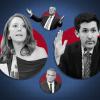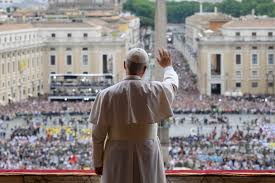
Breaking News
 Turning All U.S. Roads into Toll Roads: "Tax by Mile" is Here
Turning All U.S. Roads into Toll Roads: "Tax by Mile" is Here
 RFK's Deputy: Saviour or Wolf in Sheep's Clothing?
RFK's Deputy: Saviour or Wolf in Sheep's Clothing?
 One of America's biggest companies is imploding
One of America's biggest companies is imploding
 Zombie Voyager 1 Spacecraft Resurrects Its "Dead" Thrusters Over 15 Billion Miles Away
Zombie Voyager 1 Spacecraft Resurrects Its "Dead" Thrusters Over 15 Billion Miles Away
Top Tech News
 Watch: Jetson's One Aircraft Just Competed in the First eVTOL Race
Watch: Jetson's One Aircraft Just Competed in the First eVTOL Race
 Cab-less truck glider leaps autonomously between road and rail
Cab-less truck glider leaps autonomously between road and rail
 Can Tesla DOJO Chips Pass Nvidia GPUs?
Can Tesla DOJO Chips Pass Nvidia GPUs?
 Iron-fortified lumber could be a greener alternative to steel beams
Iron-fortified lumber could be a greener alternative to steel beams
 One man, 856 venom hits, and the path to a universal snakebite cure
One man, 856 venom hits, and the path to a universal snakebite cure
 Dr. McCullough reveals cancer-fighting drug Big Pharma hopes you never hear about…
Dr. McCullough reveals cancer-fighting drug Big Pharma hopes you never hear about…
 EXCLUSIVE: Raytheon Whistleblower Who Exposed The Neutrino Earthquake Weapon In Antarctica...
EXCLUSIVE: Raytheon Whistleblower Who Exposed The Neutrino Earthquake Weapon In Antarctica...
 Doctors Say Injecting Gold Into Eyeballs Could Restore Lost Vision
Doctors Say Injecting Gold Into Eyeballs Could Restore Lost Vision
Yes, the Visible Head of the Church Is the Pope--This Is Our Christian Faith

In a recent post on her Substack newsletter, Sarah Cain made a statement that, although predictable and already common in such difficult times, always gives us pause for thought: "Pope Francis was the biggest impediment to my conversion. I know that I'm not alone in that."
Clearly, Cain is not the only one who has had to overcome such a difficulty. Terrible problems and doubts have confronted all those converts to Catholicism who, like myself, embraced—out of ignorance or excessive enthusiasm—a hyper-papalist interpretation of Pastor Aeternus, the famous dogmatic constitution from the First Vatican Council. Without a doubt, this type of purification of our Faith is one of the most painful imaginable.
Putting aside for now the discussions about "good popes/bad popes" and all the consequences of disastrous pontificates (especially when, at least through ambiguity, our faith is put at risk), many of those who have found themselves facing the walls of hyper-papalist Jericho still believe in the authority of the hierarchical structure of the Church as ordained by God and in the necessity of the papal office.
Unfortunately, there are also many Catholics who have not passed the test. If I mention only the names Rod Dreher and Michael Warren Davis, I am sure you will immediately understand whom I am referring to. These are all those who, scandalized by the ambiguity of the pontificate that has just ended, not only left the Catholic Church but went so far as to deny the very existence of the papal office.
It is tragic that such former Catholic thinkers and authors claim to be "orthodox" while denying a teaching—the dogma of infallibility—which is a Truth of faith confessed by saints like Basil the Great, Maximus the Confessor, and Theodore the Studite. A careful reading of the section titled "La Monarchie Ecclésiastique fondée par Jésus-Christ" ("The Ecclesiastical Monarchy Founded by Jesus Christ") from Vladimir Solovyov's work La Russie et l'Église Universelle (Russia and the Universal Church) might help them discover some of those testimonies of the Holy Fathers—Greek and Latin—who recognized both the primacy and the infallibility of the Apostle Peter and his successors.
In any case, I hasten to add that the denial of the pope's infallibility on the part of the "orthodox" does not stop there. In the end, it leads to the rejection of the very existence of the papal office. It is as if an "orthodox" scandalized by the sins of a certain metropolitan or bishop were not only to criticize that particular hierarch but to deny the very function itself. He might do so directly, but more often—and this is usually what happens—he does it indirectly, by denying the main prerogatives of the office.

 Node without Consent
Node without Consent Dark Matter: An 86-lb, 800-hp EV motor by Koenigsegg
Dark Matter: An 86-lb, 800-hp EV motor by Koenigsegg

